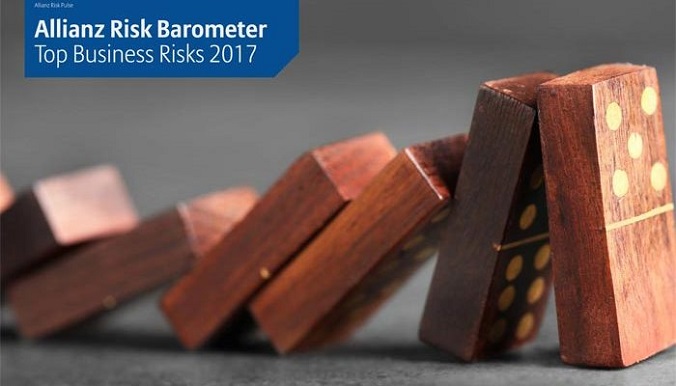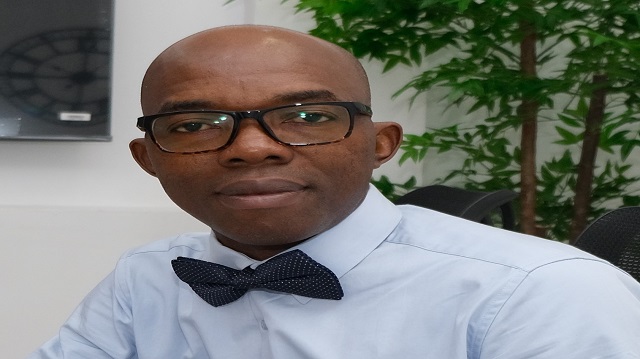General News
Allianz Risk Barometer Says Corruption, Burden on Nigerian Businesses

The Allianz Risk Barometer 2018 report has revealed that theft, fraud and corruption as the top risk in Nigeria with 38% of responses, up from #4 in 2017.
Market developments remains unchanged at #2 at 36% of responses and changes in legislation & regulation also remains unmoved at #3 with 33% of responses.
Fire, explosion and power blackouts (both #7 with 16% of responses) emerged as two new risks in the top 10.
Cyber incidents remains at #5 at 29%, political risks and violence is unmoved at #6 with 24%, macroeconomic developments is #4 at 31% of responses down from #1 in 2017, business interruption moves down slightly from #8 to #9 with 16% responses and new technologies maintains the 10th position at 11%. The report is published annually by Allianz Global Corporate & Specialty (AGCS), and is based on the insight of a record 1,911 risk experts from 80 countries.
Studies show that corruption is a significant obstacle to business in Nigeria. Companies are very likely to encounter bribery and other corrupt practices.
Corruption also features as a top 10 risk in West African countries, Togo and Ivory Coast, which participated in the survey for the first time.
To provide financial protection for managers against the consequences of actual or alleged “wrongful acts” when acting in the scope of their managerial duties, companies may consider taking up Director & Officers (D&O) insurance.
The D&O policy will pay for defense costs and financial losses. In addition, extensions to many D&O policies also cover costs for managers generated by administrative and criminal proceedings or in the course of investigations by regulators or criminal prosecutors.
The market and economic conditions are improving. “Recently, Nigeria resolved a six-quarter recession and an exchange rate crisis. A better business environment, as well as the recovery of oil prices should help accelerate growth in 2018 to over 2.5% from 0.8% in 2017. However, the inflation persistence to around 12.9% in 2018 may well trigger another depreciation pressure on the Naira,” said Stéphane Colliac, Senior Economist from AGCS sister company, Euler Hermes.
Businesses’ perception of the threat posed by political risks and violence remains relatively unchanged year-on-year. However, respondents are more worried about terrorism. Businesses do not have to be the direct victim to feel the effects. If an attack occurs nearby, the surrounding area may be closed, impacting operations. Globally, a general trend of increased political activism can be anticipated, causing further disruption.
Business interruption (BI) can have a tremendous effect on a company’s revenues. Yet its impact is one of the hardest risks to measure. “No business is too small to be impacted,” says AGCS Africa CEO Thusang Mahlangu, “A severe interruption can even have a terminal impact, particularly for smaller companies. But as many businesses transition from being rich in physical assets to deriving more value from intangibles and services, increasingly, BI is being triggered by non-traditional risk exposures which don’t cause physical damage but result in lost income – so-called nondamage business interruption (NDBI).”
Fire, explosion, which is a major source of BI, is a serious concern for Nigerian businesses, especially considering the many incidents that occurred in 2017. As one of the world’s largest oil and gas producers, the country is highly susceptible to accidental fires that may interrupt power supplies. It is a known fact that power blackouts are prominent in the region. In fact, in a recent outage across the country, the ministry of power blamed it on a fire at a gas pipeline system that interrupted gas supply and affected the national transmission grid. Local businesses should ensure they have a sufficient backup or risk management plan for the production halt.
Cyber incidents through events such as WannaCry and Petya ransomware attacks brought significant financial losses to a large number of businesses. Cyber threats also vary according to company size or industry. “Small companies are likely to be crippled if hit with a ransomware attack, while larger firms are targets of a greater range of threats, such as the DDoS attacks which can overwhelm systems,” says AGCS Cyber Insurance Expert Nobuhle Nkosi.
New technologies rank as the second top risk for the long-term future after cyber incidents globally, with which it is closely interlinked. Vulnerability of automated or even autonomous or self-learning machines to failure or malicious cyber acts, such as extortion or espionage, will increase in future and could have a significant impact if critical infrastructure, such as IT networks or power supply, are involved.
“Although there may be fewer smaller losses due to automation and monitoring minimizing the human error factor, this may be replaced by the potential for large-scale losses, once an incident happens,” explains Michael Bruch, Head of Emerging Trends, AGCS. “Businesses also have to prepare for new risks and liabilities as responsibilities shift from human to machine, and therefore to the manufacturer or software supplier. Assignment and coverage of liability will become much more challenging in future.”
General News
Firm Gives Advice on How to Stay Secure as AI, robots and VR are Redefining Family Life

Over the past 10 years, families have experienced shifts in structure and a perceived increase in fragmented interactions at home, largely driven by the pervasive use of technology and changing social norms. What does the next decade hold in store?

According to a global survey* by Kaspersky’s market research center, an overwhelming 81% of people believe digitalisation will fundamentally alter families’ joint pastimes within the next decade. This shift points to a future where bonding is mediated by advanced technology, creating new rituals and challenges in equal measure.
Screen time is family time, but it has its risks
Nearly half (48%) of all respondents envision AI-powered bedtime stories becoming a norm, a figure that rises to 53% among 18–34-year-olds. Today, apps and smart devices offer AI-narrated tales with customisable characters and plot twists.
For the busy parent, it presents a novel aid, for the child, an endlessly patient, interactive storyteller.
Meanwhile, with 31% of families anticipating children opting for digital pets over real ones, it seems that ‘man’s best friend’ just got its first update.
It should be noted, however, that while AI has the potential to enrich a child’s life, it necessitates vigilance. When children interact with AI, for stories or learning, parents must be proactive.
Select services with strong privacy policies that do not unnecessarily store or misuse a child’s data or voice interactions and further enhance control with digital parenting assistants like Kaspersky Safe Kids to restrict content and balance screen time.
Parents would be well placed to treat AI interactions as a new digital playground where they can use parental controls to limit session duration, choose vetted, age-appropriate AI story platforms, and most importantly, maintain an open dialogue about what these stories are and how they are created. Explain to children that an AI is a tool, not a friend, and encourage them to report any strange or uncomfortable interactions, just as they would in the physical world.
The key is to ensure AI complements human interaction, not replaces the comfort of a parent’s voice.
Blowing out the digital candles
Another 43% predict family celebrations migrating to video call formats as a standard, not an exception, a trend accelerated by recent global events but now seen as a permanent fixture for dispersed families.
Meanwhile a daring 26% can imagine taking family vacations entirely in virtual reality. This sounds like the stuff of science fiction, but then 10 years ago, the type of generative AI being used today was not widely anticipated.
This fragmented outlook highlights that the future of family digital activity will not arrive as a uniform wave, but as a series of adoptions shaped by cultural openness and digital infrastructure. For security leaders like Kaspersky, this evolving landscape presents new vectors for risk within the most intimate of spaces, the smart home.
Preparing the digital home for tomorrow’s family
43% of all respondents foresee home robots as family members. Moving beyond voice-activated personal assistants or autonomous vacuum cleaners, these would be embodied AI companions capable of tutoring, playing games, or providing companionship.
In the eyes of hackers, however, every new device, from a VR headset to a robot nanny, is a potential entry point. To keep things secure, change default passwords immediately, ensure all device firmware is regularly updated, and segment your home network.
Use Kaspersky Premium with a Smart Home Monitor which scans users’ home Wi-Fi network 24/7, and shows a list of devices connected to it, including such details as device type, OS and IP address, and alerts when a new or unknown device connects.
As robots, AI, and VR devices become part of the family circle, security must be foundational, not an afterthought.
“The accelerating pace of technology is not fragmenting the family but redefining its shared spaces. The future, as seen by the global majority, is one where digital and physical experiences blend to create new forms of togetherness, from a grandparent joining a birthday party via hologram to a child caring for a digital pet with a sibling across the globe.
“The challenge and opportunity lie in building secure digital environments with intention, ensuring they are safe, respectful, and ultimately, tools that bring us closer,” comments Seifallah Jedidi, Head of Consumer Channel for META at Kaspersky.
General News
Corporate Comms in the Age of Crypto: Why Nigeria’s Digital Finance Future Depends on Trust

By John Kokome
By the time you finish reading this article, the price of Bitcoin may have changed twice. That is the nature of cryptocurrency, fast, volatile, and borderless. Yet beyond price charts and trading apps lies a less discussed but critical pillar of Nigeria’s digital finance revolution: corporate communications. In the age of crypto, communication is no longer a support function. It is infrastructure.

Nigeria is one of the world’s fastest-growing crypto markets. Chainalysis ranked the country second globally in cryptocurrency adoption in 2023, driven largely by everyday retail users rather than institutions.
Between July 2023 and June 2024 alone, Nigerians received an estimated $59 billion in cryptocurrency value, the highest in Sub-Saharan Africa. Yet public perception remains sharply divided, crypto is seen as opportunity by some and risk or outright scam by others.
In such an environment, how crypto companies communicate can determine whether they earn trust, attract scrutiny, or lose credibility entirely.
The Complexity Challenge
Blockchain, decentralised finance, wallets, custody, smart contracts etc., are not everyday concepts for most Nigerians. Yet millions are expected to trust these systems with their savings, businesses, and livelihoods.
Corporate communications must therefore evolve from promotion to translation. Crypto companies must become educators, simplifying complex ideas without downplaying risks.
Hype must give way to clarity; speculation must yield to responsibility.
Some homegrown platforms, including FlashChange and other emerging African crypto brands, have begun prioritising financial literacy and user education. That shift is encouraging, but it must become the industry norm, not the exception.
Trust as a Strategic Asset
Trust in financial institutions is fragile globally, but particularly so in emerging markets where currency devaluation and policy uncertainty are familiar experiences. Crypto gained traction in Nigeria partly because people sought alternatives.
Still, crypto companies cannot assume automatic trust. In traditional banking, trust has been built over decades. In crypto, trust is built in real time, on social media, customer support channels, and community forums.
A single outage, security breach, or regulatory misunderstanding can escalate into a reputational crisis. Silence is read as guilt. Ambiguity feels deceptive. Delay looks incompetent. In Nigeria’s fast-moving digital ecosystem, communication speed must match market speed.
Nigeria’s policy evolution on crypto reinforces this point. In December 2023, the Central Bank of Nigeria (CBN) issued guidelines allowing banks to open accounts for Virtual Asset Service Providers, effectively shifting from restriction to regulation.
The CBN acknowledged that global trends demand oversight, not exclusion, while warning of risks related to money laundering, terrorism financing, and consumer protection gaps.
The Securities and Exchange Commission (SEC) has echoed this stance, emphasising that Nigeria’s digital asset future must be anchored on innovation, collaboration, and trust, with clear licensing and investor protection frameworks.The message is clear: crypto is now part of Nigeria’s financial architecture, and communication is central to compliance.
A Young, Digital Audience
Nigeria’s demographics explain crypto’s momentum. According to the National Bureau of Statistics, over 63 percent of Nigerians are under 25, and internet penetration now exceeds 50 percent, driven largely by mobile broadband. This digital-native population consumes information quickly, questions authority openly, and shapes narratives in real time.
Corporate communications teams must engage this audience with transparency and relevance, not marketing noise.
Crisis Communications in a 24/7 Market
Crypto markets never sleep. Crises do not respect office hours. Hacks, liquidity shocks, and regulatory announcements can happen at any moment.
Communications teams must therefore operate like newsrooms prepared, responsive, and coordinated. Pre-approved crisis playbooks, trained spokespersons, and real-time monitoring are no longer optional.
Most importantly, crisis communication must be human-centred. Nigerians want clear answers: Is my money safe? What happened? What comes next?
Brands that respond with honesty and empathy endure. Those that hide behind jargon do not.
Narrative Capital vs Market Share
In Nigeria’s crowded fintech and crypto space, companies often compete on fees and features. But the most durable advantage is narrative capital the credibility and emotional connection built over time.
Narrative capital determines whether users stay during downturns, regulators listen during consultations, and the media seek your voice. Platforms like FlashChange have a responsibility to tell Africa’s crypto story with authenticity, data, and purpose.
From Evangelists to Translators
Nigeria no longer needs crypto evangelists promising disruption. It needs translators, professionals who connect blockchain to remittances, wallets to small businesses, and decentralisation to economic opportunity.
As crypto matures, corporate communications will increasingly determine its legitimacy. Code may power platforms, but communication powers confidence. And confidence, more than any algorithm, will decide whether digital finance fulfils its promise for Nigeria.
John Kokome is the Corporate Communications Manager at FlashChange, a fintech platform redefining secure digital asset exchange. With experience across fintech, cryptocurrency, telecoms, and development communications in Africa. He currently leads strategic storytelling, reputation management, and stakeholder engagement initiatives at the company, focusing on building trust, transparency, and financial literacy in the digital assets space. John’s work sits at the intersection of policy, technology, and public perception, with a strong emphasis on Africa-first narratives and responsible innovation. He has contributed opinion pieces and thought leadership articles on governance, youth empowerment, branding, and Nigeria’s evolving digital economy.
General News
Senate confirms Oyewole as Supreme Court justice

Senate has confirmed Hon. Justice Joseph Olubunmi Kayode Oyewole, JCA, as a Justice of the Supreme Court of Nigeria.

Hon. Justice Joseph Olubunmi Kayode Oyewole, JCA
The confirmation was concluded on Tuesday, February 3, following the presentation and consideration of a report by the Senate Committee on Judiciary, Human Rights and Legal Matters.
The report was presented by the committee’s chairman, Senator Adeniyi Adegbonmire of the All Progressives Congress, representing Ondo Central.
Presenting the report, Senator Adegbonmire said: “That the Senate do Receive and Consider the Report of the Committee on Judiciary, Human Rights & Legal Matters on the confirmation of the nomination of Hon. Justice Joseph Olubunmi Kayode Oyewole, JCA, as a Justice of the Supreme Court of Nigeria.”
The confirmation followed a formal request by Bola Tinubu, who wrote to the Senate last Tuesday seeking legislative approval for the appointment. The letter was read on the floor of the Senate by the President of the Senate, Godswill Akpabio.
In the letter, President Tinubu stated: “Pursuant to Section 231 (2) of the 1999 Constitution of the Federal Republic of Nigeria as amended.
“I am pleased to present for confirmation by the Senate the appointment of Hon. Justice Oyewole Kayode as Justice of the Supreme Court of Nigeria. While it is my hope that the Senate will consider and confirm the nomination expeditiously, please accept the assurances of my highest regards.”
Following the reading of the letter, Akpabio referred the executive communication to the Senate Committee on Judiciary, Human Rights and Legal Matters for further legislative action.
The committee was directed to carry out its work and report back to the Senate as soon as possible, a process that culminated in the confirmation approved by the chamber.

 Telecom3 days ago
Telecom3 days agoTelecom Operators Invest Over $1Bn on 2,850 New Sites in 2025 – NCC

 E-Financial3 days ago
E-Financial3 days agoIf Capital is the Answer, What Exactly is the Problem with First Holdco

 E-Financial3 days ago
E-Financial3 days agoAmaanah Finance to Unveils Non-Interest Banking Services Today

 E-Financial2 days ago
E-Financial2 days agoAccidental Billionaire Opts for Jail Instead of Returning Money Credited Him by Mistake

 News3 days ago
News3 days agoNSCDC Hands over Fake Crypto Currency Trader to EFCC

 General News3 days ago
General News3 days agoFirst Trustees to Host 8th Islamic Estate Planning Clinic in Abuja

 News3 days ago
News3 days agoAlakija’s Flourish Africa Provides N300m Grants for Women Entrepreneurs

 News2 days ago
News2 days agoUS Set to Deport 79 Nigerians on Criminal List















